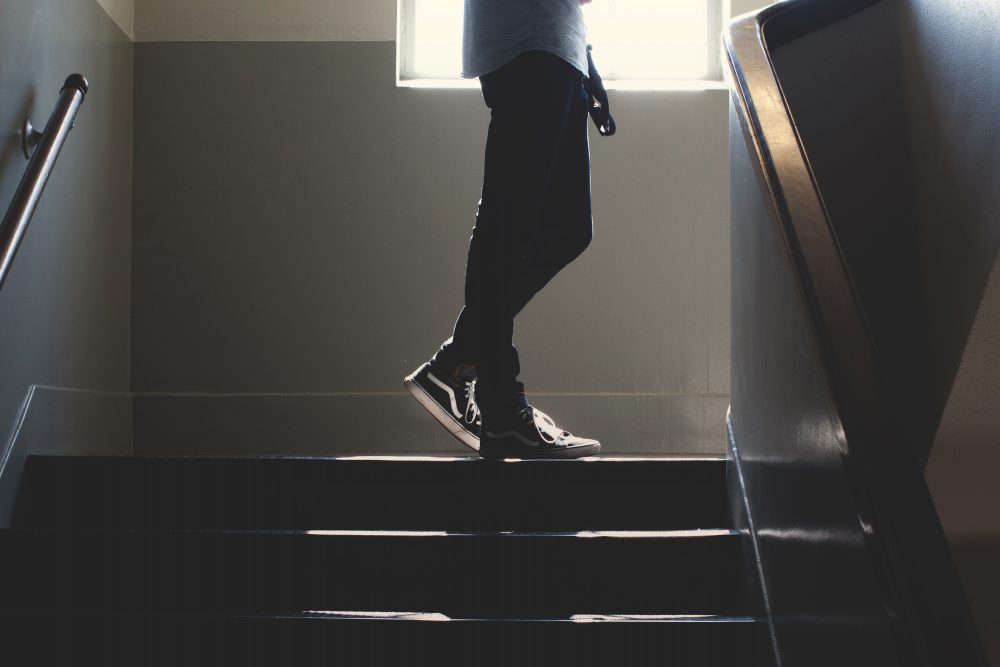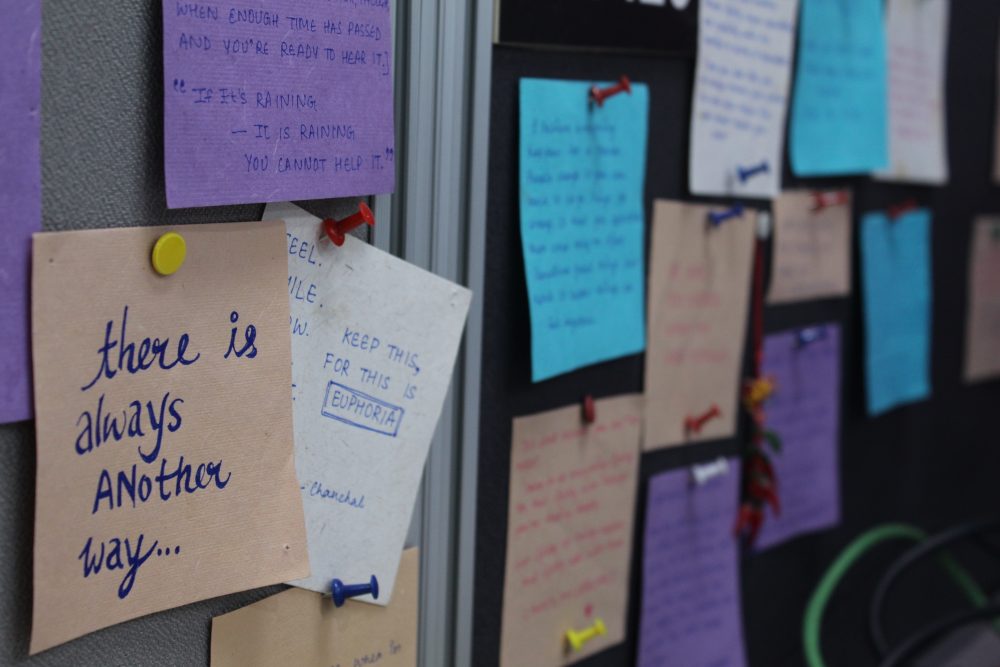You're on the Young People Site
Dedicated to self-harm recovery, insight and support.

The blog post below was written by Ellen.
When I was 11, I began to suffer from intense panic attacks and I turned to self harm to alleviate some of that pain. Seven years later, I’ve got a long list of diagnosis, including anorexia nervosa, depression and anxiety.
Throughout my GCSEs I barely went to school. I taught myself the courses at home and pushed through my exams. I managed to get A*s, but I couldn’t shake the feeling that I wasn’t really living.
The school I was in at the time was very focused on getting the top grades and getting girls into the ‘best' universities. But even at 11 I knew I didn’t want to be a lawyer or a doctor or an accountant or an engineer… but I couldn’t work out what I did want. And I’ve realised that that’s okay.
One of the biggest steps I’ve taken was starting therapy again. I stopped going for a long time because my body and mind were too weak to benefit from it because of my anorexia, but once I was at a stable weight I went back. My therapist has allowed me to open my eyes to the beauty in the world and always encourages me to chase my dreams, even if I’m not sure exactly what I want. She’s helped me to look for coincidences in life; the world starts to connect up and forms a safety net around you.
She was crucial in helping me transfer to an art college for sixth form, and it’s one of the best decisions I’ve ever made. Things are still really hard sometimes but I am learning to get in touch with myself more and I feel like the universe is there to support me.
I have found myself in art; I joined weekend classes in a London photography studio when I was 15 and I realised I could explore a format people want to see and that makes sense to me. I love to create narratives through both words and images; I am interested in psychology and colour theory and I use art to try and understand myself and others.

I created a scanography series in which I expressed my mental health journey through distorted self-portraits and eerie colour palettes. I was inspired by Amy Hughes, a painter I found reading Aesthetica magazine. Encased (2017) is psychologically and physically charged; I was struck by the strong highlights arching over a figure's back with an agonised, scrunched up face, distorted by the reflected light and texture of a plastic prison. I reached out to Amy and interviewed her for my project - she even invited me to the opening of her show! She encouraged me to express my true-self, which helped me develop my interest in the nature of mankind.

According to a survey carried out by the Mental Health Foundation 2018, 74% of adults in the UK alone report feeling overwhelmed or unable to cope. 51% of these adults felt depressed, and 61% felt anxious. 16% had self harmed and 32% said they had experienced suicidal thoughts. It is hard to tell whether we are just noticing and appreciating the effects of mental health more nowadays, or if there is a crisis as dramatic as reported. Either way, to experience mental health issues or to support someone with them is incredibly, painstakingly hard. I know from my own experience how isolated, hopeless and empty these problems can make you feel. Some of my images are my attempt at describing how you can feel like you're living multiple lives; we lie to people and tell them we're okay, we are misunderstood by others, and we don't know how we even really feel.
As the scanner moved, I lifted my head and lowered it at regular intervals to create the more frozen style of image. I’ve also tried to depict the feelings of isolation, disorientation and sadness. I pressed my face against the scanner to create visible pressure on my nose and forehead; the world is so vast and scary, yet we can feel caught-up and claustrophobic living in it. The qualities of the images create a kind of wavering mood-line - a bit like a line graph - as well as confusion and feeling out of control. I moved my face along with the scanner, not worrying about the slight shake of my body as I did so as this is what created the wavering effect.

I didn't want to make them specific to any one mental health issue; they are universal and can be understood by many. For instance, some images may as a representation of schizophrenia. I wanted to create a sense of understanding for those suffering due to mental health issues, be it the one who is ill or the one caring for them, and also to educate those who think the mentally ill are simply 'over dramatic' or 'not worth helping'.
Reasons to try being creative 🎨...
1️⃣ Creatives activities can help to reduce stress levels, aid mental calmness and serve as a relaxing distraction. You can get absorbed in your mental flow when creating.
2️⃣ Art also helps creative thinking; it can better your problem-solving skills. There are no wrong answers in art and we are allowed to imagine our own solutions. Flexible thought can stimulate in the way that learning a new language can.
3️⃣ Art can improve cognitive abilities and memory for people with serious brain disorders, such as dementia, by stimulating cell growth in the brain.
4️⃣ Chronic health conditions can be left behind while you create; a positive experience, and a chance to achieve allows you to express your feelings and help you find your identity.

The blog post below was written by Sophie, a previous Graduate Volunteer with SelfharmUK and Youthscape.
I’m not usually someone who gets really excited for Christmas Day. For as long as I can remember, I was always at my mum’s for half of the day and my dad’s for the other half. I never really had a problem with having two homes – it was quite nice sometimes! But Christmas is the time when having a broken family is highlighted. Seeing other people’s festive photos would get to me. Obviously I knew not everyone was having the perfect Christmas, but seeing friends having big, ‘perfect’ family do’s would just remind me that I didn’t have that. At one house, it was almost like people were trying to play happy families when it wasn’t the case at all. It just felt forced and awkward.
I don’t find it as much of an issue now, and I’m even prepared for the drama I know will take place this year! But around Christmastime, feelings are automatically triggered for me based on how I’ve experienced Christmas in the past. So over the years it’s become normal to not feel the best during this time, but it’s something that is changing!
A few years ago, I was out with some friends and the place where we were, happened to have a Christmas themed night (bearing in mind it was April, so I don’t know what was going on there!) They’d play a Christmas song every few songs and it got to the point where I had to take a step outside as it was just making me feel down. Of course, everyone LOVED it, and they were dancing around, singing at the top of their lungs. I thought everyone liked Christmas, until one of my friends joined me outside. I explained why I was out there, and she turned to me and shared how she didn’t really like Christmas that much either. She was just going along with it, having a sing and dance. It was SO refreshing to hear I wasn’t the only one in there pretending.
However you are feeling this Christmas, you are not alone.
Did you know that it’s okay to not be okay at Christmas?
It sometimes seems like we have to be so joyful at Christmas, so we put on fake smiles and go along with the festivities when really, for some, it’s a time of pain, anxiety, stress. Perhaps Christmas reminds you that a loved one is no longer with you, perhaps it reminds you of how broken your family is. There are many reasons why Christmas may not be the happiest time of the year for you, and that’s totally okay.
The thing is, it’s pretty hard to avoid Christmas altogether, but there are always ways you can try and make it easier for yourself.
Knowing that the urge to self harm is usually heightened at Christmas can give you the upper hand as it won’t catch you off guard. It means you can come up with a number of distractions and other ways to cope in those moments. You can find some suggestions here. Take time for yourself this Christmas – you don’t have to fake how you’re feeling.
This year I’m choosing to shift my focus from the things I don’t like about Christmas, to the things I’m thankful for, appreciating what I do have rather than what I don’t. I want to be thinking more about the real meaning of Christmas rather than being so caught up in my own circumstances. I’m going to make more time for self-care; doing things that help energise and fill me rather than drain me.
A YouTuber I’ve found to be really helpful is Kati Morton. She is a licenced therapist and creates videos on a broad range of topics surrounding mental health and answers questions from her viewers. My particular favourite this year is a video where she gives some handy tips on how you can stay mindful at Christmas...

Here at SelfharmUK we want to help people understand their harming behaviour and explore other ways to cope with life's challenges.
If you get in touch we'll listen to your story and suggest ways to help you move forward ... but somewhere along the line we'll almost always suggest you visit your GP. This can be a really tough thing to do, we know it can be scary, and can mean having to tell your parents too (though not always) but we believe it can be a significant step towards feeling better.
We asked GP David Roberts what you can expect when talking to your doctor about self-harm and whilst this article is only a guide - and not a definitive set of facts - we hope it will help you feel more in control, if and when, you walk into that consulting room...
Why do I have to go to the Doctor?
Self-harming is usually an indication that all is not right. People sometimes do it because it relieves internal tension and stress. It is not a very good way of doing this and like drugs, alcohol and smoking ultimately doesn't do any good. But in the short term it gives a temporary relief from emotional pain. However, it can be a symptom of a more serious mental illness and so your doctor can make sure you get the help you need.
Can I go on my own or do I have to take a parent?
You can legally go to the GP alone aged 16, but doctors can accept that you may be able to make your own decisions about your health (eg contraception) from 14 if they think you understand things and are mature enough to do so. A doctor would want you to involve your parent(s) in your care until you are 16 and are likely to encourage you. They would not give you an injection or carry out an operation, or even do an intimate (embarrassing) examination (physical check) without your parent's permission before you are 16.
How can I get ready for my appointment?
Even if you are under 16 That does not mean that you cannot talk to them about your problems or issues. It is a good idea to think about what you want to say and write the main points down. Lots of people get embarrassed at what they want to say and so don't get to the point. Doctors are busy and don't get embarrassed by what you think or say, so it is better to take a deep breath and say it right at the beginning rather than put it off. They won't mind and it will give them more time to talk to you than if you spend the first five minutes talking about a rash that no one can see because it really isn't there! Think about what you want to get out of the appointment - do you just want to tell someone and get it off your chest, do you want help stopping it, do you want them to refer you on to someone who could give you specialist help? If you tell them what you want then they can work out how best to support you.
What will happen if I say I self harm?
Self harming is quite common and they will have seen other people who do it. So they won't be shocked, but they will be concerned. The biggest concern they would have is that you might want to kill yourself. Not many people who self harm want to do this but doctors have a professional duty to assess the risk of that happening. they are obliged to keep what you say confidential and private between you and them, unless you tell them something that they think might indicate that your health is seriously at risk (or you might be planning to do something that might endanger someone else) - see later - in which case they may be obliged to break your confidence. They should tell you this. They will want to help you, and so if you have plucked up courage to tell them, they will try to find ways to do that.
What will they ask me?
This might include asking some deep questions which you might find embarrassing: don't be though, they're only trying to work out what's making you do this. They'll ask about cutting, taking drugs, overdoses, and other ways you might be tempted to hurt yourself. They may ask you about how you feel (low, depressed, crying, worried, frightened, angry) and how things are at home or school or work. If they feel you trust them they might ask you to come back again to see them, and they might suggest that they refer you on to see a specialist from the CAMH service (people who work most of their time with young people with similar problems). They might encourage you to speak to a counsellor at school, particularly if there is someone there you feel you can talk to. They will want to know why you have come to see them at that time and to find out what help you want them to give you. You may not be able to say this, but if you've thought about it beforehand it will help.
Do they have to tell my parents?
They are obliged in law to protect you and others from actions you might take that might harm you or others. But they need to check how likely your might be to do something you say you want to do so they will question you quite hard. If you are under 16 and they think you are suicidal (or planning a murder!) they will have to tell your parents or other authorities. They will still encourage you to involve your parents as they have legal responsibility for you, but if the risk is low in their view, they will try their best to keep what you say confidential.
Will I have to show them where I have self-harmed?
They can't and won't force you (unless they are seriously worried about you being in danger and even then they will ask for advice from someone who specialises in child protection). They will want to assess how bad your injuries are - you might need antibiotics if your cuts are infected, and you might need dressings to protect the wounds.
Remember they aren't easily shocked or embarrassed and really want to help you - showing them the extent of your cutting will help them work out how serious the problem is and how to get you the best help.


There are so many things we can achieve in life – whether it’s the first steps in walking; being able to read; working out a maths problem or getting your first job – we learn new things daily.
One thing I think is way harder than anything else to achieve in life is forgiveness.
It sounds so easy yet is so very, very hard to do. It’s a long process – we might say ‘we forgive you’ but the feelings of resentment, hurt and anger are harder too control.
Forgiveness is a choice – it involves our brain deciding on it as it’s a choice; it involves actively putting it into practise and it involves letting go of the emotions that are so strong – even more so if we need to forgive ourselves.
We all make mistakes; perfection isn’t real and doesn’t exist (see the vlog on perfectionism); we are going to mess up – life is a learning curve. In the same way it took most of us about 18 months to walk; it takes years to forgive.
Forgiving yourself is the same process as forgiving someone else, but often harder as we are the forgiver and the forgive (the person being forgiven) so most of us go through a cycle of being kind to ourselves about the mistakes we have made; then, once we feel the resentment/anger creeping back, we are even harder on ourselves than before – and so the cycle continues……
Breaking the ‘forgiveness/self- anger’ cycle takes time; a lot of daily positive self-talking (list things you do like about yourself), often physically writing what you forgive yourself for (arguing with people, saying unkind things, not doing as well as you could…) and learning, again and again, to tell yourself ‘ I am human. I will make mistakes. I am forgiven. I choose to forgive’.
It’s a life time mantra - it will take forever because our life is about journeying to grow as people, so be gentle to yourself and start your self-forgiveness journey today.

Forgiveness takes a lifetime. It’s a learnt process that ebbs and flows in our life: some people we can forgive quickly and easily, others it is painfully hard to allow ourselves to ‘let go’.
If a friend or family member is self-harming it can be hard not to feel hurt, angry or betrayed even. You may be angry that they didn’t tell you sooner or angry that they didn’t come to you as you may feel you could have helped them before it got to self-harm; you might feel very hurt by them and their lack of trust in not being able to ask for help; you may feel betrayed that they appear not to trust you enough with their thoughts and feelings.
If you are feeling like that; forgive them. You may feel that you have outwardly but perhaps inside those feelings still bubble up from time to time. Forgiving takes a long time – it’s a choice that you have to choose each time those feelings creep up on you. Forgive your friend, their self-harm is not your fault, it’s not something you could do anything to stop and it’s not yours to carry.
Chances are, they didn’t want or mean to hurt you. Often people who are struggling with self-harm carry huge bags of guilt and they might be harming their bodies as they don’t want to hurt anyone emotionally.
It takes a great deal of maturity to be able to let go of your own hurt and put yourself in someone else’s shoes: today, on Self-harm Awareness Day, take some time to think about forgiving your friend and consider what it might be like to walk in their shoes.
As a friend your role is to support and get your friend to get some help from people trained to do so; if you want to, why don’t you and your friend sign up together to our Alumina support programme?
Whether you are self-harming, or are friends with someone who is - you are never alone.

Dame Kelly Holmes; seven times gold medallist, Olympic extraordinaire and exceptional athlete, Kelly has worked incredibly hard for all she has achieved and I’m sure there has been sacrifices along the way.
This weekend Kelly revealed that in the lowest point of her life she turned to self-harm. Her exact words in the interview were “At my lowest, I was cutting myself with scissors every day that I was injured to cope with my emotional anguish”
There can be many reasons why people begin to self-harm and the pressure that Kelly felt in those weeks and months would have been devastating and all consuming, she had no other way to deal with the emotional pain she was carrying and her self-harm was the only thing that helped her to cope.
I think this is another stark reminder that it is not just 14-year-old girls who self-harm, but that it can affect anyone at any stage in their life, whatever circumstance they find themselves in. Kelly Holmes is not an attention seeker, she is not crazy, she was just totally unable to process the divesting news that she may not compete again. I would imagine she felt lonely and completely out of control.
Feeling out of control is something a lot of the young people we work with feel and can lead them to harm. This story is also a reminder that all people regardless of what they do for a living or their worldly status can feel lonely, isolated and out of control.
This interview does however end with a light at the end of the tunnel, she kept going and got the help and support she needed. With this support, Kelly managed to stop harming, this is remarkable and I think offers real hope for anyone who currently finds themselves in a dark and lonely place. This is not to say the road to recovery is easy and doesn’t take a lot of time and perseverance, but it does remind us it is possible. We must be ready to share how we are feeling with someone in our lives to begin our journey of change and healing. This is not easy, but is necessary to begin to process how we bring about change.
This should also challenge us to think about our own recovery, so ask yourself:
- What are the things that are causing you to try to gain some control?
- How does controlling food help to make things better?
- What things may need to change for the need to control to fade?
If you would like to gain some support about self-harm you can sign up to Alumina, our six-week support programme.
We also have books to help with the self-harm recovery which you can purchase via our store.
You can read more about Dame Kelly Holmes struggle with self-harm here.

We have heard it from parents, teachers and librarians countless times in our lives and, sadly, often negatively, in a ‘don’t make any noise’ sense!
How about ‘quiet’ in a positive way? ‘quiet’ said in a soothing, gentle way encourages us to relax, breathe and slow down.
Silence and quiet are things that are hard to achieve – maybe we don’t enjoy our own company; maybe we like to keep busy and have background noise constantly; maybe silence isn’t something we are comfortable with?
If silence isn’t something you feel comfortable with it, try it in small amounts to begin with. Thursday 14th September is National Quiet Day, a day all about encouraging you to find a place that feels safe and comfortable where you can relax (or maybe even fall asleep, as that’s what tends to happen when we find places that are quiet!).
Finding quiet in our noisy, crammed lives is hard. It is a discipline we have to learn to take time to listen to what our feelings are saying, what our thoughts are wanting us to ponder and what our body is trying to tell us about how we are doing physically.
You might find sitting with your own thoughts uncomfortable; perhaps all your thoughts and feelings come flooding into your head? That’s ok – write them down, tackle them one by one and give yourself time to think through each feeling that comes into your thoughts. Acknowledge it. Name the feeling. Validate it in the way you would let a friend know you understand them – give yourself permission to feel.
Perhaps finding your quiet place will allow you to draw or sing your thoughts? Hey, no one needs to see or hear you (that’s the joy of a quiet place!), so if you want to sing, shout, cry or laugh – do!
Perhaps reading will allow you some time to read for pleasure? Read slowly enjoying each paragraph. Find a book you loved as a child and go back to it.
Perhaps learning to breathe slower, deeper so your lungs are filled like a balloon might help you relax your muscles, your brain and anxieties?
Quiet offers us the ability to listen to ourselves. Giving yourself the gift of quiet allows you to give you what you give to some many others: your concentration, your love and your thoughts.
This year, why not use National Quiet Day to find some quiet to be with yourself?
If you already have your very own quiet place - we’d love to see it! This could be anything from that bench that you always find peaceful on your daily dog walk, that patch of grass on top of that hill with the best view near your house, your sofa at home or even that place you always like to sit at your favourite cafe. Send your images to info@selfharm.co.uk and we’ll post the best ones on our Instagram, Facebook, Tumblr and Twitter on the day in the hope of inspiring others to find their own quiet places.
You can also follow the hashtag on Twitter, Facebook and Instagram. #NationalQuietDay

Yeah, I know, some people love it and some hate it! Hollyoaks is the marmite of soap operas :0
It is the only soap we watch in my house of 2 teenagers. Why? Because we love the fact that it represents gay people, straight people, mental health issues and race issues far more than anything else on TV (unproportionally so, I know!).
There’s a story line at the moment about Lily Drinkwell (yep, that is her name!) who has begun self-harming after numerous issues in her life: mum dying, boyfriend issues, rejection and body image. It shows the complexity of the emotions: it isn’t ever juts one thing that leads a person to begin to self-harm: it is many, many things that have all layered upon each other to create a set of complex emotions that a person feels are out of control.
Lily impulsively self-harmed the first time: it wasn’t planned, she hadn’t expected to do it. In our experience at SelfharmUK, this is often the way: the first time isn’t thought through but is reaction to huge feelings of strong emotions. Lily then feels guilty and ashamed afterwards: her aunt notices blood on the towel and insists she gets medical attention. This, is where soap opera land differs from real life: for many young people, their self-harm isn’t noticed for some time. It then becomes a coping strategy to deal with those emotions that aren’t going away, but are, in fact, becoming more layered, due to the guilt of self-harming and fear of being ‘found out’.
If this is you, if you are in this cycle, whether it’s been a one off self-harm, or whether you feel you are stuck in this never ending cycle of harming; feeling bad; feeling guilty; harming to release the feelings…; we want to support you.
At SelfharmUK we are pretty unshockable, we don’t judge you, we don’t tell anyone (unless we urgently need to for safety). We aren’t about how TV portrays self-harm; we are about the reality of it: the long haul, no quick fixes, giving you information on looking after yourself and your injuries, ideas about pulling apart those emotions positively with trained people: we are about what you are about.
We listen; we chat; we offer help; we offer ideas of new ways; we help you consider what’s going on in those layers of emotions so that you can, when you want to, find a new way of coping with those strong, real and confusing feelings.
We run a safe place online, called Alumina, where trained people can support you.

The Pride celebrations in London are over for another year, but coming out can still feel like a struggle. The blog post below was written by Lydia. She hopes you find it helpful.
Coming out for many people is hard. But not for everyone. My own experiences shone a light on how enlightening this experience and care free it can be. In the past month I have finally come out as bisexual.
Before it happened I was petrified, being bisexual was never something I was completely sure on. Liking someone of the same sex I had never denied the possibility but I had also never embraced it until it happened. My own experiences of coming out might be or have been extremely different from anyone else. Everyone is different that's how we're made and how we experiences life is also extremely different from one another.
Coming out for me felt like I was finally being able to be who I wanted to be and like who I wanted to like. I had decided years before I was going to wait until I found someone of the same sex before I came out as bisexual. This decision was made by myself so I could find someone who I liked and take it at my own pace. The decision was also made so I myself I knew I like the same sex more than as friends since it was something I had questioned. And it happened. I found her. And it was like a tsunami sweeping me away when it happened. It was the most liberating and freeing thing I could have ever experienced. But fear also began to consume me. I had never dated a girl before so what would everyone think? But I thought about it, a lot. And I came to realise that there's millions of people out there who identify themselves in the LGTBQI society. I wasn't alone in this and this wasn't uncommon thing to be going through. Telling my family was the easy bit, luckily for me they were accepting and weren't phased by me being with a girl. My friends, what can I say? They were great about it, confused and questioning where it had come from but supportive.
The impact coming out has had on my life has been incredibly positive. It's helped me overcome so many battles and issues and made me realise that it's okay to be myself. I've realised that the people who will talk are the people who don't understand and that's ok, that's not your fault, it's up to them to educate themselves. It also been a way of me accepting myself more and learning to love myself for who I am. Because I am a strong independent woman who falls in love with whoever I want to and I won't conform to anyone's expectations. I highly recommend for those still in question about coming out to do it. Because you in yourself will feel so much better for it.
To sum coming out in one word I'd use ‘empowering’.
You can check out Lydia's blog and vlogging links here.
You can also visit the Stonewall website for further support.
For more information about self-harm in LGBTQI young people, check out our Facts page.

The road to ‘recovery’ from self-harm can be full of twists and turns: you may feel that you are ready and want to look for alternative coping strategies – here are some things to consider:
Deciding to stop, or reduce your self-harming behaviour is a huge step forward: it shows a mindset desperately wanting to find a ‘new way’. Go gently on yourself.
Many people talk about reducing gradually before deciding to finally stop. This may be helpful for you or you may decide you need to separate yourself from it immediately. Either way is fine – don’t put too much pressure on yourself though.
Take a day at a time, or even half a day. This is will depend on what your pattern of harming is, the frequency of it, how long you have been engaged in it and what are the external things that might be causing you stress. Perhaps set yourself a timer, and add an hour/half day/day to it each time?
Plan when and how to reduce or stop. Think about what else is going on for you currently -how are you coping with school, exams, family stuff, friendship issues? If you have any major stress factors (like exams), consider waiting until they have been as resolved as they can be, before reducing or stopping. This way, if you are struggling, you won’t be putting yourself under impossible pressure.
Recognise it may take a while. Whatever form of harming behavior you have been using to cope, it will be an addiction and a habit. Retraining your brain to find a new way of coping will take time – allow yourself time to experiment with different coping strategies to find what works for you.
At the start, it’s important we are honest with you: none of the coping strategies will give you the same relief you have found in your harming. Wearing elastic bands, using ice cubes or exercise are alternatives; your brain will take a bit of time to rewire itself to recognize this as the new way of coping. The physical and emotional relief you might get from your harming, may not be fully relieved immediately by using alternatives.
The most important thing is, however long it takes; even if it’s two steps forward and one back; you move forward at your pace. Don’t go too hard on yourself. Be as kind to you, as you are to your friends.
Always show yourself love, patience and kindness.
We have list of tried and tested alternative strategies, but please, let us know others as the longer the list, the more we can all offer other young people who are seeking to looking for a new coping strategy.
We are with you in this, you aren’t alone. Literally thousands of others are with you in this journey through self-harm to recovery; let’s take small steps forward together.

The piece below was written by Jo Fitzsimmons, a member of the SelfharmUK Team. The urge to self-harm is often all consuming and when it comes, it's hard to think of anything else! Next time you feel the urge to self-harm, try slowly reading this outloud, whilst breathing deeply.
I am twitchy, full of nervous energy
I can’t sit still, I can’t focus,
I am breathing quickly,
I am wringing my hands.
I try to calm myself
I try to take control
The thoughts are coming quickly
Spiralling into my head
My breathing gets faster
I must take control
Slow
Slow slow slow slow
Slow
I tell myself
The battle is done – I make the choice
Run on the spot
Clench my fists
Breathe Breathe Breathe
Run on the spot
Clench my fists
Breathe Breathe Breathe
I feel the urge
Slow Slow Slow
I match my breathing to the dogs
I bite my hands and wait
And wait
And wait
The tears begin to flow
The urge has passed
I made the choice

We don’t often recognise fear in ourselves – perhaps we cover it with anger (at the thing we are fearful about) or shame (that we feel scared); fear is powerful and hinders us in so many areas of our lives.
As humans we are built with a ‘fight or flight’ response in our brains, this means we either stand and literally fight when we are scared or we run from the thing that scares us. But what do we do if the thing that scares us, is us?
Whether it be fear of our feelings and that we might act on those deep feelings; whether it be of a person we fear for what they might say to us or do to hurt us; whether it be the fear of feeling which cripples us – Fear is hard to overcome.
Often the feeling of fear is mixed with feeling anxious. Perhaps you get a bad tummy and have to run to the loo, maybe you take too many pills to ease the worry, you might cut to try and take away the fear – however you try and deal with it, here are a few ideas to help reduce the fear inside:
Acknowledge it. Learn to recognise which feelings inside you are which; fear feels different to anger, but often anger is an emotion that is secondary. If you are feeling angry a lot, ask yourself ‘is there another feeling underneath it’?
Get fear out of you. The more fear comes out from inside us, the less power it has to stop us living our life. Whether you are able to speak it by telling someone, whether you write out what it is that you are fearing, whether you draw it, whether you text it; get it out. It’s like a Harry Potter dementor, it will suck life from you.
Breathe. The more scared we are, the less we breathe, the less we breathe, the more we have panic attacks.
While you are calm, practise breathing slowing, count breaths in and out, teach yourself to breath slowly so the blood and oxygen allow you to continue to think clearly and remain calm.
Be active. Fear creates adrenalin in us, this makes us feel on edge and twichy. Work with your body, if you are feeling like this; do a work out, find a yoga clip on youtube, go for a run, repeatedly punch a pillow – let the adrenalin out of your system so you can calm down.
Deal with the fear. The hardest one of all: can you deal with the actual issue of your fear? Is there any solution or resolution in facing the issue or person that is making you feel this fearful? Currently the person or situation is ruling your life and hindering you flourishing: what, if anything, can you do to change that?

The blog post below was written by a lovely lady called Emma, who got in touch with SelfharmUK to share her story about her recovery from bulimia and self-harm.
Dear Reader,
What I am writing here is really a love letter to my younger self, and I hope that it will help you too. You see, I grew up not knowing how to love myself. In fact, it felt selfish to do that. I felt, for many, many years, that I was somehow a bad and unlovable person. I developed a lot of ‘coping strategies’ to keep myself feeling that I could not be hurt by other people.
I don’t know what tactics you are using, but mine were mainly around pretending: pretending to be confident, pretending to be friendly, pretending to be happy, pretending to be transparent and open – and all the time, inside, I hated myself (and many of them), I didn’t trust anyone, I was self-harming, bulimic and generally wishing that I was dead.
There is so much stigma about mental health, when all it really is – is some sad memories and an imbalance of the chemicals in our brain. Isn’t it weird that society makes it seem more than that? That we feel embarrassed to be sick? Stupid, isn’t it. Well – I’m not embarrassed anymore. I am proud – very, very proud for having the courage to say I was sick, and continuing my journey to get well.
People often think that when we have depression and anxiety or hurt ourselves, we are being selfish – that we are ‘wrapped up’ in ourselves. I often found that people criticised me in that way. And yet I felt that I was living for others. I must have been – because I didn’t love myself enough to be living for me – back then…
You know what? Self-harm is not selfish. It’s self-preservation. The pain in the heart is so strong that sometimes you feel like you want to just smash the world apart, hit people, break things, scream, set the world on fire, destroy your life and that of those around you. So, instead of doing those things, we turn the pain inwards and cut, scrape, pick, harm our own bodies… or stuff our bellies and throw it up… or refuse to eat… because for a little while we get to be in control, we get to decide - and while we are feeling that physical pain, we get some relief from the torture inside our chemically unbalanced little minds and our sad hearts.
I don’t know your exact circumstances or what you are doing to yourself in order to try to handle those very difficult feelings. But let me tell you something, I know for a fact that you are trying! I know for a fact that, right now, as you read this blog, you are doing your very best to try and get well. People who want to stay depressed, anxious or unhappy do not surf the internet to find blogs like this one. Because you are looking for advice and help, you are on your way towards health.
Let that be a source of hope for you. I am so proud of you for investing in yourself by reading this blog. We have never met, but I promise you, you are more deeply loved than you can ever imagine. Recovery is not easy, but you can get well – and you have already started your journey of recovery. Keep going! I promise you, you can do this. I know you find it so very hard to believe – but I promise you, you can.
Lots of love,
Emma
